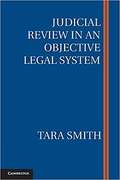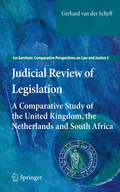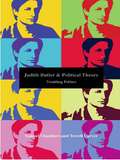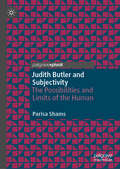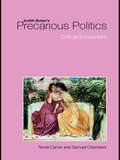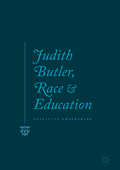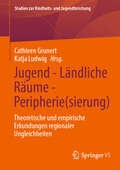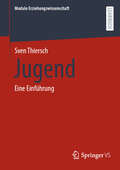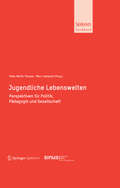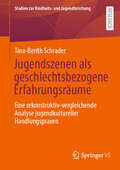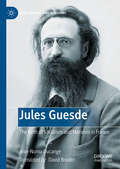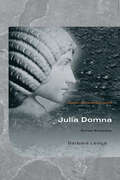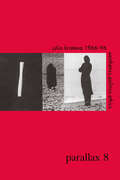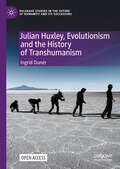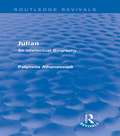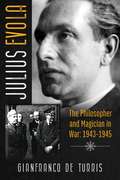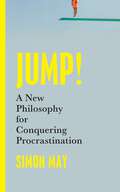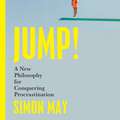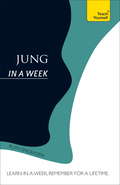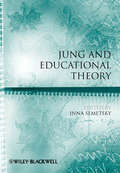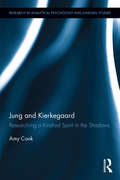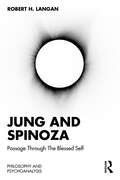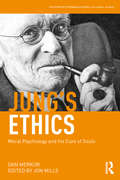- Table View
- List View
Judicial Review in an Objective Legal System
by Tara SmithHow should courts interpret the law? While all agree that courts must be objective, people differ sharply over what this demands in practice: fidelity to the text? To the will of the people? To certain moral ideals? In Judicial Review in an Objective Legal System, Tara Smith breaks through the false dichotomies inherent in dominant theories - various forms of originalism, living constitutionalism, and minimalism - to present a new approach to judicial review. She contends that we cannot assess judicial review in isolation from the larger enterprise of which it is a part. By providing careful clarification of both the function of the legal system as well as of objectivity itself, she produces a compelling, firmly grounded account of genuinely objective judicial review. Smith's innovative approach marks a welcome advance for anyone interested in legal objectivity and individual rights.
Judicial Review of Legislation
by Gerhard van der SchyffConstitutionalism is the permanent quest to control state power, of which the judicial review of legislation is a prime example. Although the judicial review of legislation is increasingly common in modern societies, it is not a finished project. This device still raises questions as to whether judicial review is justified, and how it may be structured. Yet, judicial review's justification and its scope are seldom addressed in the same study, thereby making for an inconvenient divorce of these two related avenues of study. To narrow the divide, the object of this work is quite straightforward. Namely, is the idea of judicial review defensible, and what influences its design and scope? This book addresses these matters by comparing the judicial review of legislation in the United Kingdom (the Human Rights Act of 1998), the Netherlands (the Halsema Proposal of 2002) and the Constitution of South Africa of 1996. These systems present valuable material to study the issues raised by judicial review. The Netherlands is of particular interest as its Constitution still prohibits the constitutional review of acts of parliament, while allowing treaty review of such acts. The Halsema Proposal wants to even out this difference by allowing the courts also to apply constitutional norms to legislation and not only to international norms. The Human Rights Act and the South African Constitution also present interesting questions that will make their study worthwhile. One can think of the issue of dialogue between the legislature and the judiciary. This topic enjoys increased attention in the United Kingdom but is somewhat underexplored in South African thought on judicial review. These and similar issues are studied in each of the three systems, to not only gain a better understanding of the systems as such, but also of judicial review in general.
Judith Butler and Political Theory: Troubling Politics
by Terrell Carver Samuel A ChambersOver the past twenty-five years the work of Judith Butler has had an extraordinary impact on numerous disciplines and interdisciplinary projects across the humanities and social sciences. This original study is the first to take a thematic approach to Butler as a political thinker. Starting with an explanation of her terms of analysis, Judith Butler and Political Theory develops Butler’s theory of the political through an exploration of her politics of troubling given categories and approaches. By developing concepts such as normative violence and subversion and by elaborating her critique of heteronormativity, this book moves deftly between Butler’s earliest and most famous writings on gender and her more recent interventions in post-9/11 politics. This book, along with its companion volume, Judith Butler's Precarious Politics, marks an intellectual event for political theory, with major implications for feminism, women’s studies, gender studies, cultural studies, lesbian and gay studies, queer theory and anyone with a critical interest in contemporary American ‘great power’ politics.
Judith Butler and Subjectivity: The Possibilities and Limits of the Human
by Parisa ShamsThis book contextualises philosophy by bringing Judith Butler’s critique of identity into dialogue with an analysis of the transgressive self in dramatic literature. The author draws on Butler’s reflections on human agency and subjectivity to offer a fresh perspective for understanding the political and ethical stakes of identity as formed within a complex web of relations with human and non-human others. The book first positions a detailed analysis of Butler’s theory of subject formation within a broader framework of feminist philosophy and then incorporates examples and case studies from dramatic literature to argue that the subject is formed in relation to external forces, yet within its formation lies a space for transgressing the same environments and relations that condition the subject’s existence. By virtue of a fundamental dependency on conditions and relations that bring human beings into existence, they emerge as political and ethical agents capable of resisting the formative forces of power and responding – ethically – to the call of others.
Judith Butler's Precarious Politics: Critical Encounters
by Terrell Carver Samuel A. ChambersJudith Butler has been arguably the most important gender theorist of the past twenty years. This edited volume draws leading international political theorists into dialogue with her political theory. Each chapter is written by an acclaimed political theorist and concentrates on a particular aspect of Butler's work. The book is divided into five sections which reflect the interdisciplinary nature of Butler's work and activism: Butler and Philosophy: explores Butler’s unique relationship to the discipline of philosophy, considering her work in light of its philosophical contributions Butler and Subjectivity: covers the vexed question of subjectivity with which Butler has engaged throughout her published history Butler and Gender: considers the most problematic area, gender, taken by many to be primary to Butler’s work Butler and Democracy: engages with Butler’s significant contribution to the literature of radical democracy and to the central political issues faced by our post-cold war Butler and Action: focuses directly on the question of political agency and political action in Butler’s work. Along with its companion volume, Judith Butler and Political Theory, it marks an intellectual event for political theory, with major implications for feminism, women’s studies, gender studies, cultural studies, lesbian and gay studies, queer theory and anyone with a critical interest in contemporary American ‘great power’ politics.
Judith Butler, Race and Education
by Charlotte ChaddertonThis book provides an analysis of race and education through the lens of the work of Judith Butler. Although Butler tends to be best known in the field of education for her work on gender and sexuality, her work more broadly encompasses the functioning of power and hegemonic norms and the formation of subjects, and thus can also be applied to analyse issues of race. Applying a Butlerian framework to race allows us to question its ontological status, while considering it a hegemonic norm and a performative notion which has a significant impact on real lives. The author considers the implications of Butler’s thinking for debates; addressing diverse contemporary educational issues in which race continues to be (re)produced, such as the formation of leaner identities, the production of the good citizen, raising student aspirations, counter terrorism and surveillance in education, and qualitative research in education. This book will be of interest to students and scholars of education and race, the sociology of education and equality of opportunity.
Jugend - Ländliche Räume - Peripherie: Theoretische und empirische Erkundungen regionaler Ungleichheiten (Studien zur Kindheits- und Jugendforschung #11)
by Cathleen Grunert Katja LudwigIm Zentrum des Sammelbandes steht die Frage nach der Relevanz regionaler und räumlicher Differenzierungsperspektiven für eine Jugendforschung, die den Anspruch hegt, die lebensweltlichen Realitäten junger Menschen angemessen in den Blick zu nehmen. Eine regional orientierte Jugendforschung steht dabei vor der Herausforderung, weder komplexitätsreduzierende, dichotomisierende und stigmatisierende oder romantisierende Narrative in Bezug auf Stadt und Land bzw. periphere und prosperierende Regionen zu verfestigen noch Containerraumvorstellungen zu reproduzieren. Vielmehr gilt es zu fragen, wie im Zusammenspiel von Jugendlichen und anderen Akteur:innen Lebensrealitäten und deren Bearbeitungen hergestellt werden, um so die Reflexion damit einhergehender Spannungsfelder in das Zentrum zu stellen. Die Beiträge geben einen Einblick in die mehrdimensionalen Gewebe der Hervorbringung von Jugend und ländlichen Räumen unter besonderer Berücksichtigung von Peripherisierungsprozessen. Sie bündeln damit die aktuellen Diskussionen und empirischen Befunde zu den Lebenslagen, Handlungsorientierungen und Ausdrucksformen Jugendlicher in peripher(isiert)en ländlichen Regionen im Kontext der Verbindung von räumlicher und sozialer Ungleichheit.
Jugend, Familie und Generationen im Wandel: Erziehungswissenschaftliche Facetten
by Alena Berg Thorsten Fuchs Anja SchierbaumJugend, Familie und Generationen sind durch einen fortschreitenden sozialen Wandel in allen Lebensbereichen charakterisiert. Eine Gesamtgestalt der vielgestaltigen Entwicklungen herauszuarbeiten, scheint kaum noch möglich. Im Zentrum des vorliegenden Bands steht daher die Erarbeitung von erziehungswissenschaftlichen Facetten. Die beteiligten Autorinnen und Autoren nehmen sich mit theoretisch-konzeptionellen Überlegungen und aktuellen Forschungsprojekten den Veränderungen (spät-)moderner Jugendwelten mitsamt den hierdurch hervortretenden wissenschaftlichen Herausforderungen an, diskutieren unterschiedliche Teilaspekte der Jugendforschung, reflektieren Konturen der Familienerziehung und setzen Stichworte um Generationenbeziehungen und -verhältnisse auf die Agenda. Die zusammengetragenen Befunde gleichen dabei dem Sehen mit einem Facettenauge, das – bestehend aus zahlreichen einzelnen Linsen – bei gleichbleibender Größe ein erstaunliches Gesamtbild zum Wandel von Jugend, Familie und Generationen liefert.
Jugend: Eine Einführung (Module Erziehungswissenschaft #12)
by Sven ThierschIn zahlreichen Handlungsfeldern sind Jugendliche die zentralen Akteur*innen und Adressat*innen der pädagogischen Praxis. In dieser erziehungswissenschaftlichen Einführung wird kompakt diskutiert und festgehalten, welche unterschiedlichen Perspektiven auf Jugend bestehen, welche aktuellen Erkenntnisse zum Aufwachsen von Jugendlichen in ihren Lebenswelten vorliegen und wie pädagogisches Handeln mit ihnen reflektiert werden kann. Das Buch leitet anhand von Fallbeispielen und -rekonstruktionen systematisch in grundlegende Fragen, Begriffe und Theorien von Jugend ein.
Jugendliche Lebenswelten
by Peter Martin Thomas Marc CalmbachEin ermutigendes Buch, das endlich einmal nicht den Defizitblick in der Vordergrund stellt, sondern zeigt, wie viele Ressourcen die junge Generation in Deutschland in Wirklichkeit hat. Klaus HurrelmannWie sehen die aktuellen Lebenswelten 14- bis 17-Jähriger in Deutschland aus? Wie denken, fühlen und lernen sie, wie gestalten sie ihren Alltag, wo finden sie Sinn, Chancen und Anerkennung? Eine große Vielfalt an grundlegenden Wertorientierungen, an Alltagseinstellungen etwa zu Schule, Familie, Freizeit, Konsum und Medien sowie Unterschiede in der sozialen Lage kennzeichnen Jugendliche heute. Ähnliche Lebensweisen und Lebensauffassungen gruppiert die Sinus-Jugendforschung in verschiedenen Lebenswelten, die die Vielfalt der Jugend abbilden. Diese Studien des SINUS-Instituts zählen mittlerweile zu den Standardwerken der Jugendforschung und bilden eine wichtige Grundlage für die Arbeit mit jungen Menschen. Jugendliche Lebenswelten befasst sich mit den Fragen, Handlungsanforderungen und Perspektiven, die sich aus der Kenntnis jugendlicher Lebenswelten ergeben. Angesprochen werden Themen wie das Interesse Jugendlicher an Selbstinszenierung und Jugendszenen oder deren Begeisterung für Mode- und Elektronik-Marken. Diese werden oft problemorientiert diskutiert, während die Autorinnen und Autoren in diesem Buch sie als zentrale Facette von Identität auffassen. Bei der Frage nach dem Verständnis von politischer Bildung diskutieren sie , wie man verhindert, "benachteiligte Jugendliche" auszugrenzen. Den zeitlosen Begriffen wie Sinn, Glück und Erfolg und deren unterschiedlichen Bedeutungshorizonten in den verschiedenen Lebenswelten widmet sich ein weiteres Kapitel. Mit den wünschenswerten und notwendigen Implikationen für Politik, Pädagogik und Gesellschaft schließen die Herausgeber von Jugendliche Lebenswelten. Klaus Hurrelmann Wie sehen die aktuellen Lebenswelten 14- bis 17-Jähriger in Deutschland aus? Wie denken, fühlen und lernen sie, wie gestalten sie ihren Alltag, wo finden sie Sinn, Chancen und Anerkennung? Eine große Vielfalt an grundlegenden Wertorientierungen, an Alltagseinstellungen etwa zu Schule, Familie, Freizeit, Konsum und Medien sowie Unterschiede in der sozialen Lage kennzeichnen Jugendliche heute. Ähnliche Lebensweisen und Lebensauffassungen gruppiert die Sinus-Jugendforschung in verschiedenen Lebenswelten, die die Vielfalt der Jugend abbilden. Diese Studien des SINUS-Instituts zählen mittlerweile zu den Standardwerken der Jugendforschung und bilden eine wichtige Grundlage für die Arbeit mit jungen Menschen. Jugendliche Lebenswelten befasst sich mit den Fragen, Handlungsanforderungen und Perspektiven, die sich aus der Kenntnis jugendlicher Lebenswelten ergeben. Angesprochen werden Themen wie das Interesse Jugendlicher an Selbstinszenierung und Jugendszenen oder deren Begeisterung für Mode- und Elektronik-Marken. Diese werden oft problemorientiert diskutiert, während die Autorinnen und Autoren in diesem Buch sie als zentrale Facette von Identität auffassen. Bei der Frage nach dem Verständnis von politischer Bildung diskutieren sie , wie man verhindert, "benachteiligte Jugendliche" auszugrenzen. Den zeitlosen Begriffen wie Sinn, Glück und Erfolg und deren unterschiedlichen Bedeutungshorizonten in den verschiedenen Lebenswelten widmet sich ein weiteres Kapitel. Mit den wünschenswerten und notwendigen Implikationen für Politik, Pädagogik und Gesellschaft schließen die Herausgeber von Jugendliche Lebenswelten.
Jugendszenen als geschlechtsbezogene Erfahrungsräume: Eine rekonstruktiv-vergleichende Analyse jugendkultureller Handlungspraxen (Studien zur Kindheits- und Jugendforschung #12)
by Tina-Berith SchraderJugendszenen wie Gothic und Metal sind, wie auch andere jugendkulturelle Phänomene, Räume, in denen Geschlechterrollen verhandelt, neu gestaltet oder reproduziert werden. Tina-Berith Schrader untersucht in diesem Buch mithilfe der dokumentarischen Methode anhand von Gruppendiskussionen auf Musikfestivals, wie Geschlecht in diesen Szenen erlebt und ausgehandelt wird und welche Auswirkungen dies auf Partizipation, Praktiken und Stile hat. Dabei wird ein breites Spektrum theoretischer Ansätze aus der Geschlechter- und Jugendkulturforschung berücksichtigt. Die Forschungsergebnisse beleuchten vier zentrale Kontexte, darunter die Szene als alternativer sozialer Raum und das Musikfestival als Ort geschlechtsspezifischer Erfahrungen. Ergänzt wird dies durch eine Typologie, die Szenenspezifik und gemeinsame Erfahrungsräume sichtbar macht.
Jules Guesde: The Birth of Socialism and Marxism in France (Marx, Engels, and Marxisms)
by Jean-Numa DucangeWhat explains France’s unique Left? Many works have reflected upon the importance of Marxism in France, yet few studies have been devoted to the man who did most to introduce Marxism into its political culture: the today near-forgotten figure of Jules Guesde. It was with Guesde that Karl Marx drafted the world’s first Marxist program, and Guesde who aroused the enthusiasm of countless worker-militants who saw him as their most important leader. Jules Guesde represents the first book-length study of the French socialist leader translated into the English language. For the radical Left today, Guesde is often considered a dogmatist who supported the Union sacrée during World War I and rejected the Bolshevik revolution; for the governmental Left, he embodies an intransigent ideologue who held back the modernization of the French Left. Throughout Jules Guesde, Jean-Numa Ducange argues that it is impossible to study the history of the French socialist movement without a close look at this singular figure and offers a fuller picture of the deep transformations of the Left and Marxism in France from the late 19th century up to the present. This scholarly biography of Jules Guesde seeks to put Guesde’s record on a properly historical footing, closely analysing both archival sources and accounts by his contemporaries. Chapter One begins with his early life and the mark left on him by the Paris Commune and exile. Chapter Two emphasises Guesde’s importance as leader of a distinct current of French socialism, recognised by figures like Karl Marx and Friedrich Engels. Chapter Three sees Guesde become an MP for working-class Roubaix, exploring the contradictions between his revolutionary rhetoric and concrete political practice. Chapter Four turns to the years following his electoral defeat in 1898 and his renewed intransigence in the period of the Dreyfus affair and rivalry with Jaurès. Chapter Five explores his key role in the formation of a united Socialist Party. Chapter Six examines the test of World War I and Guesde’s anguish at the divisions of French socialism. The book then concludes with an examination of Guesde’s contested legacy, as both a “founding father” and figure subject to often pejorative framings.
Julia Domna: Syrian Empress (Women of the Ancient World)
by Barbara LevickThis book covers Julia’s life, and charts her travels throughout the Empire from Aswan to York during a period of profound upheaval, and seeks the truth about this woman who inspired such extreme and contrasting views, exposing the instability of our sources about her, and characterizing a sympathetic, courageous, intelligent, and important woman. This book contains a fresh re-assessment of the one of the most significant figures of her time and questions: • Was Julia more powerful than earlier empresses? • Did she really promote despotism? • How seriously is her literary circle to be taken? As part of a dynasty which used force and violence to preserve its rule, she was distrusted by its subjects; as a Syrian, she was the object of prejudice; as a woman with power, she was resented. On the other hand, Domna was the centre of a literary circle considered highly significant by nineteenth-century admirers.
Julia Kristeva
by Joanne MorraFirst published in 1998. Routledge is an imprint of Taylor & Francis, an informa company.
Julian Huxley, Evolutionism and the History of Transhumanism (Palgrave Studies in the Future of Humanity and its Successors)
by Ingrid DunérThe evolutionary biologist Julian Huxley (1887–1975) attempted to promote a “religion for the future,” which he would come to refer to as Transhumanism. Transhumanism was an attempt to unite a more traditional humanistic view of the human as containing some form of core essence or potential with an evolutionary point of view of humans as a work in progress. Before humans, natural selection had been responsible for the transformation of life. Through its ordering principles and through chance, it had given rise to humankind, which had ushered in a new phase of evolution. Humanity stood on the threshold of yet another critical point in evolution: The consciously purposive phase of evolution. This open access book explores the history of transhumanism by analyzing how Julian Huxley’s transhumanism develops and why it does at this particular point in time, by placing it firmly within the context of his specific scientific and sociopolitical milieu, starting roughly in the interwar years and stretching over the Second World War to the 1970s. Continuing, the study then focuses on the new transhumanists of the 1970s, 1980s and 1990s and investigates continuity in mode of thinking, contributing to a more coherent understanding of transhumanism, its history and of modern projects of human enhancement. The book captures how scientific and technological development in relation to society and social order shapes images and expectations of the future and of what future is desirable.
Julian: An Intellectual Biography (Routledge Revivals)
by Polymnia AthanassiadiJulian: An Intellectual Biography, first published in 1981, presents a penetrating and scholarly analysis of Julian’s intellectual development against the background of philosophy and religion in the late Roman Empire. Professor Polymnia Athanassiadi tells the story of Julian’s transformation from a reclusive and scholarly adolescent into a capable general and an audacious social reformer. However, his character was fraught with a great many contradictions, tensions and inconsistencies: he could be sensitive and intelligent, but also uncontrollably spontaneous and subject to alternating fits of considerable self-pity and self-delusion. Athanassiadi traces the Emperor Julian’s responses to personal and public challenges, and dwells on the conflicts that each weighty choice imposed on him. This analysis of Julian’s character and of all the issues that confronted him as an emperor, intellectual and mystic is based largely on contemporary evidence, with particular emphasis on the extensive writings of the man himself.
Julius Evola: The Philosopher and Magician in War: 1943-1945
by Gianfranco de TurrisAn intimate portrait of Evola and his wartime activities that rebuts many of the Fascist pseudo-myths about him • Traces the Baron&’s activities in Italy, Germany, and Austria during World War II • Clarifies Evola&’s relations with Nazism and Fascism and reveals how he passionately rejected both ideologies because they were totalitarian • Draws on personal conversations with those who knew Evola, new documentation never before made public, and letters from the Hakl and Scaligero archives Baron Giulio Cesare Andrea Evola, known to the English-speaking world as Julius Evola (1898–1974), was an Italian philosopher, magician, painter, occultist, Orientalist, linguist, and champion mountain climber. Often considered a pillar of Neo-Fascist thought, Evola opposed Fascism and called himself a &“radical traditionalist.&” In this exploration of Evola&’s inner and outer life from World War II into the early 1950s, Gianfranco de Turris, who knew Evola when he was alive and is the executor of his estate, offers a new portrait of Julius Evola and debunks many of the pseudo-myths about his activities during the war. Drawing on personal conversations with those who knew him and new documentation never before made public, including letters from the Hakl and Scaligero archives, the author traces Evola&’s activities--including his time on the run and living under assumed names--in Italy, Germany, and Austria from 1943 into the mid-1950s. He shares a thorough account of the Baron&’s sojourn at Hitler&’s headquarters in Rastenburg, his work for the German secret military services, and his passionate rejection of the racial theories that were the core of Nazi ideology. The author outlines Evola&’s critiques of Fascism and Nazism and also explores Evola&’s disapproval of the Italian Social Republic because it was destroying traditional values in favor of modernity. Detailing the Baron&’s occult and magical work during the war, de Turris shows that the only thing Evola took with him when he escaped Italy was the UR Group papers, material that would later become the three-volume work Introduction to Magic. Sharing details from Evola&’s long hospital stays during and after the war, the author proves that the injury that led to Evola&’s paralysis was caused by an Allied bombing raid in Vienna and not, as rumor has it, by a sex magic act gone horribly wrong. The author shares photographs from the time period and the Baron&’s correspondence with René Guenon on the possibility of restoring the spiritual and magical power of an authentic Freemasonry. Offering conclusive evidence that Evola was not part of the Nazi regime, de Turris sheds light on the inner workings of this legendary occult figure and what Evola believed was the best approach for the magus to take in the modern world.
Jump!: A New Philosophy for Conquering Procrastination
by Simon MayDo you repeatedly defer life to later, convinced there will come a time when you'll be better prepared to seize its opportunities?Do you spend your best hours on chores or trivia before allowing yourself to get to what most matters to you? The real mystery of procrastination is why we avoid goals to which we're passionately committed. It's understandable that we'd put off cleaning the fridge or completing our tax return; but why do we swerve a loved one, a vocation, a hobby, or a new life that feels supremely meaningful to us? Simon May argues that the almost universal consensus around overcoming procrastination - setting priorities and optimizing time management: working "smarter not harder" - might work for the boring things but is of little use when it comes to treasured goals that we're avoiding. Jump! proposes seven radically new ways in which we can overcome this life-sabotaging procrastination. May claims that, for all their pain, the regret and boredom created by procrastination can shine the brightest light on our top priorities, either reaffirming our commitment to them or teaching us that we're on the wrong path. This is the unexpected blessing of procrastination: that it offers hope of becoming ourselves.
Jump!: A New Philosophy for Conquering Procrastination
by Simon MayDo you repeatedly defer life to later, convinced there will come a time when you'll be better prepared to seize its opportunities?Do you spend your best hours on chores or trivia before allowing yourself to get to what most matters to you? The real mystery of procrastination is why we avoid goals to which we're passionately committed. It's understandable that we'd put off cleaning the fridge or completing our tax return; but why do we swerve a loved one, a vocation, a hobby, or a new life that feels supremely meaningful to us? Simon May argues that the almost universal consensus around overcoming procrastination - setting priorities and optimizing time management: working "smarter not harder" - might work for the boring things but is of little use when it comes to treasured goals that we're avoiding. Jump! proposes seven radically new ways in which we can overcome this life-sabotaging procrastination. May claims that, for all their pain, the regret and boredom created by procrastination can shine the brightest light on our top priorities, either reaffirming our commitment to them or teaching us that we're on the wrong path. This is the unexpected blessing of procrastination: that it offers hope of becoming ourselves.
Jung In A Week: Teach Yourself
by Ruth SnowdenLearn in a week, remember for a lifetime!In just one week, this accessible book will give you knowledge to last forever. End of chapter summaries and multiple choice questions are all designed to help you test your knowledge and gain confidence. So whether you are a student or you simply want to widen your knowledge, you will find this seven-day course a very memorable introduction.Sunday: Learn who Jung was and what he didMonday: Explore Jung's inner world and how this informed his ideasTuesday: Understand Jung's view of the psyche and its journeyWednesday: Consider Jung's views on dreams and symbolsThursday: Engage with Jung's understanding of personality and how we form relationshipsFriday: Find out what Jung thought about esoterica, the paranormal, religion and spirituality.Saturday: Look at how Jung's ideas have been developed over time and how they are relevant today.
Jung In A Week: Teach Yourself
by Ruth SnowdenLearn in a week, remember for a lifetime!In just one week, this accessible book will give you knowledge to last forever. End of chapter summaries and multiple choice questions are all designed to help you test your knowledge and gain confidence. So whether you are a student or you simply want to widen your knowledge, you will find this seven-day course a very memorable introduction.Sunday: Learn who Jung was and what he didMonday: Explore Jung's inner world and how this informed his ideasTuesday: Understand Jung's view of the psyche and its journeyWednesday: Consider Jung's views on dreams and symbolsThursday: Engage with Jung's understanding of personality and how we form relationshipsFriday: Find out what Jung thought about esoterica, the paranormal, religion and spirituality.Saturday: Look at how Jung's ideas have been developed over time and how they are relevant today.
Jung and Educational Theory (Educational Philosophy and Theory Special Issues #34)
by Inna SemetskyJung and Educational Theory offers a new take on Jung’s work, providing original, rich and informative material on his impact on educational research. Explores Jung’s writing from the standpoint of educational philosophy, assessing what it has to offer to theories of education Highlights Jung’s emphasis on education’s role in bringing up integrated and ethical human beings Offers the perspectives of a diversity of academics and practitioners, on topics ranging from the role of the unconscious in learning to the polytheistic classroom Both a valuable addition to the academic library and a significant new resource in the professional development of teachers
Jung and Kierkegaard: Researching a Kindred Spirit in the Shadows (Research in Analytical Psychology and Jungian Studies)
by Amy CookJung and Kierkegaard identifies authenticity, suffering and self-deception as the three key themes that connect the work of Carl Jung and Søren Kierkegaard. There is, in the thinking of these pioneering psychologists of the human condition, a fundamental belief in the healing potential of a religious outlook. This engaging and erudite text explores the significance of the similarities of thinking between Kierkegaard and Jung, bridging the gap between the former’s particular brand of existential Christian psychology and the latter’s own unique philosophy. Given the similarity of their work and experiences that were common to both of their personal biographies, particularly the relationship that each had with his father, one might expect Jung to have found in Kierkegaard a kindred spirit. Yet this was not the case, and Jung viewed Kierkegaard with great scorn. That there exists such a strong comparison and extensive overlap in the life and thought of these towering figures of psychology and philosophy leads us to question why it is that Jung so strongly rejected Kierkegaard. Such hostility is particularly fascinating given the striking similarity that Jung’s own analytical psychology bears to the Christian psychology upheld by Kierkegaard. Cook’s thought-provoking book fills a very real gap in Jungian scholarship and is the first attempt to undertake a direct comparison between Jung and Kierkegaard’s models of development. It is therefore essential reading for academics and postgraduate students with an interest in Jungian and Kierkegaard scholarship, as well as psychology, philosophy and religion more generally.
Jung and Spinoza: Passage Through The Blessed Self (Philosophy and Psychoanalysis)
by Robert LanganThis volume presents the first major study of C.G. Jung’s curious relationship with the philosophy of Baruch Spinoza.Although Jung scarcely mentions Spinoza in his work, there is an unmistakable accord between the core ideas of both thinkers, most notably regarding Spinoza’s theory of God and the monism found in Jung’s writings. Exploring why Jung shows ambivalence toward Spinoza despite their affinity, Robert H. Langan argues that Spinoza offers Jung a radical solution to problems in his psychology. What results is a new interpretation of Jung’s metaphysics, the evidence for which has gone unheeded in Jungian studies to date. Ultimately for both Jung and Spinoza, knowledge of the self leads to knowledge of the Divine, and it is this championing of a ‘transcendental immanence’ that makes Jung an unlikely yet consummate Spinozist.Jung and Spinoza will be of interest to continental philosophers and depth psychologists who wish to bridge their respective fields, as well as general audiences curious about the ideas of both thinkers.
Jung's Ethics: Moral Psychology and his Cure of Souls (Philosophy and Psychoanalysis)
by Dan MerkurThis volume presents the first organized study of Jung's ethics. Drawing on direct quotes from all of his collected works, interviews, and seminars, psychoanalyst and religious scholar Dan Merkur provides a compendium of Jung’s thoughts on various topics and themes that comprise his theoretical corpus—from the personal unconscious, repression, dreams, good and evil, and the shadow, to collective phenomena such as the archetypes, synchronicity, the psychoid, the paranormal, God, and the Self, as well as his contributions to clinical method and technique including active imagination, inner dialogue, and the process of individuation and consciousness expansion. The interconnecting thread in Merkur's approach to the subject matter is to read Jung’s work through an ethical lens. What comes to light is how Merkur systematically portrays Jung as a moralist, but also as a complex thinker who situates the human being as an instinctual animal struggling with internal conflict and naturalized sin. Merkur exposes the tension and development in Jung’s thinking by exploring his innovative clinical-technical methods and experimentation, such as through active imagination, inner dialogue, and expressive therapies, hence underscoring unconscious creativity in dreaming, symbol formation, engaging the paranormal, and artistic productions leading to expansions of consciousness, which becomes a necessary part of individuation or the working through process in pursuit of self-actualization and wholeness. In the end, we are offered a unique presentation of Jung’s core theoretical and clinical ideas centering on an ethical fulcrum, whereby his moral psychology leads to a cure of souls. Jung’s Ethics will be of interest to academics, scholars, researchers, and practitioners in the fields of Jungian studies and analytical psychology, ethics, moral psychology, philosophy, religious studies, and mental health professionals focusing on the integration of humanities and psychoanalysis.
